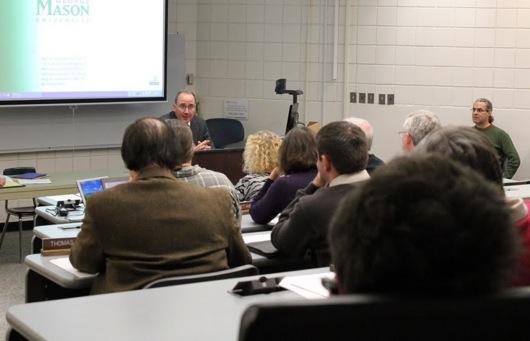Faculty promotion and tenure to undergo changes
The method through which George Mason University faculty are promoted and awarded tenure are expected to undergo potentially controversial changes.
On March 20, Mason’s Office of the Provost met with the Board of Visitors to discuss those changes.
“[We’re proposing] a different structure for the university appeals committee, and reducing the role of the Board of Visitors in the appeals process,” said Peter Stearns, provost for the university.
University appeals committees evaluate faculty requests for promotion and tenure. These committees are currently formed on a case-by-case basis and typically consist of four members. One member is chosen by the appealing faculty member and another is chosen by the provost. The two members already chosen then select the remaining two members.
The proposal establishes a single committee that will handle all cases for that year rather than on a case-by-case basis. Both the faculty and the provost will appoint members.
“It’s been hard to get people to serve on these committees, and in my opinion, they have been haphazard in their judgments,” Stearns said. “We’re trying to make a more standardized efficient structure.”
According to Stearns, the Board of Visitors currently has the position to be the “final arbiter” of these cases. If this proposal passes, then the university president assumes the role from the Board of Visitors. This is at the request of the Board itself.
“The Board is uncomfortable serving as [the] appeals court [because] it doesn't believe it knows enough about academic criteria and evidence,” Stearns said.
Stearns added that the President will only make final judgments as a “last resort.”
“Under [this] new system, negative decisions will normally stop with the Provost rather than going to the President,” said Stearns in an email. “That way, if there is an appeal, the President will hear [the] case for first time and [therefore] can legitimately serve as the decider of last resort.”
According to a blog post by Stearns, these proposals were met with some opposition by the faculty senate.
“Recent discussion in the faculty senate about some changes in our appeals procedure surfaced some belief about an ‘us-them’ division between faculty and administration over [promotion] and [tenure],” said Stearns in a blog post.
Stearns responded by saying the faculty senate voted on the changes, and that these changes represent a “collective reform.”
“The faculty senate felt there should be more faculty representation than [the Office of the Provost],” Stearns said. “This is not a particularly useful approach because we have a common desire to be fair.”
Departmental committees first judge cases in the fall semester, followed by a second level of committees by February. The college deans then make a report for the Provost, which is then compiled into a final report to be discussed with the president in April.
Throughout this process, judgments are based on evidence of teaching and research excellence.
“Real excellence in teaching involves high student evaluations and high ratings by faculty colleagues that evaluate for teaching work,” Stearns said. “[We also] look at research productivity rate, funding for that research, and outside letters that evaluate research quality.
Another factor of the application process is referee letters, where a departmental committee writes to several scholars in the candidate’s field for their opinions on the candidate’s work.
According to Stearns, one of the more important factors for judging these cases is the candidate’s “estimate of trajectory” based on current productivity and achievements.
“If you’re judging somebody when they’re six years out of graduate school, you’re saying, ‘you’ve great work these past six years, but we also bet you will continue to be active,’” Stearns said.

